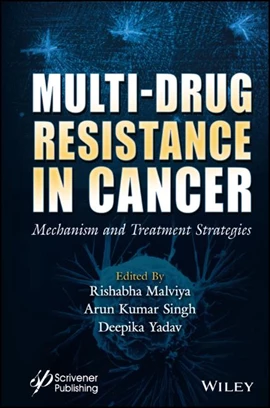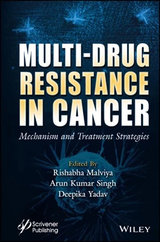Multi-Drug Resistance in Cancer
John Wiley & Sons Inc (Verlag)
978-1-394-20921-7 (ISBN)
Cancer is a major killer all over the world. Even with all the progress made, chemotherapy is still the mainstay of modern cancer treatment. The progression of the cellular defeat of numerous independent anticancer drugs in terms of their chemical structure is a major barrier to successful chemotherapy. Multi-drug resistance (MDR) is a term for the fact that most cancer patients exhibit this phenomenon. According to the numbers, drug resistance carries the blame for 90% of cancer patient deaths. Refractory cancer and tumor recurrence are common outcomes of prolonged chemotherapy. Because of the prevalence of drug-resistance mutations, the difficulty of treating tumors increases and the therapeutic efficacy of drugs decreases.
»Multi-Drug Resistance in Cancer: Mechanism and Treatment Strategies« contains nine chapters that cover topics such as: studying the mechanics of resistance to drugs by autophagy; studies to delineate the role of efflux transporters; expression of drug transporters; resistance to targeted therapies in breast cancer; advances in metallodrug driven combination treatment for cancer; and use of natural agents for the overcoming of cancer drug resistance.
The book aims to provide the latest data on the mechanisms of cellular resistance to anticancer agents currently used in clinical treatment. It provides a better understanding of the mechanisms of MDR and targets of novel chemotherapy agents which should guide future research concerning new effective strategies in cancer treatment.
This book is written for pharmaceutical and biomedical scientists and researchers at both the bench and in the clinic who are interested in the mechanisms and strategies for overcoming cancer’s multi-drug resistance.
Rishabha Malviya, PhD, is an associate professor in the Department of Pharmacy, School of Medical and Allied Sciences, Galgotias University. He has authored more than 150 research/review papers for national/international journals of repute and has been granted more than 10 patents from various countries while a further 40 patents are published/under evaluation. His areas of interest include formulation optimization, nanoformulation, targeted drug delivery, localized drug delivery, and characterization of natural polymers as pharmaceutical excipients.
Arun Kumar Singh has completed M. Pharm (pharmaceutics) from Galgotias University, Greater Noida, India. His areas of interest are in the area of nanoformulation, blockchain, IoT, machine learning, cancer, artificial intelligence, and big data.
Deepika Yadav completed M. Pharm from Galgotias University, Greater Noida, Uttar Pradesh. She has published several papers with reputed international publishers.
Foreword xiii
Preface xv
Acknowledgment xvii
1 Multi- Drug Resistance in Cancer: Understanding of Treatment Strategies 1
Rishabha Malviya, Arun Kumar Singh and Deepika Yadav
1.1 Introduction 1
1.2 Both Congenital and Developed Resistance to Drugs 3
1.2.1 Intrinsic Resistance 3
1.2.2 Acquired Resistance 4
1.3 Drug- Resistance Mechanisms 6
1.3.1 Increased Efflux of Drugs 6
1.3.2 Impact on Medication Target 7
1.3.3 Improved DNA- Damage Repair 9
1.4 Senescence Escape 9
1.5 Epigenetic Alterations 9
1.6 Tumor Heterogeneity 10
1.7 Tumor Microenvironment 11
1.8 Epithelial to Mesenchymal Transition 13
1.9 Conclusion 15
References 18
2 Understanding Different Mechanisms Involved in Cancer Drug Resistance: Proposing Novel Strategies to Overcome MDR 31
Rishabha Malviya, Arun Kumar Singh and Deepika Yadav
2.1 Introduction 31
2.2 Drug Resistance: Internal and External Variables 33
2.2.1 Phenotypic Variation of Tumors 33
2.2.2 Tumor Microenvironment 33
2.2.3 Cancer Stem Cells 33
2.2.4 Inactivation of the Anticancer Drugs 34
2.2.5 Multi-Drug Resistance 35
2.2.6 Increasing the Release of Drugs Outside the Cell 35
2.2.7 Reducing the Absorption of the Drugs 36
2.2.8 Inhibition of Cell Death (Apoptosis Pathway Blocking) 36
2.3 Improving the Pharmacokinetics 37
2.4 Changing the Aim of the Chemotherapy Agents 37
2.5 Improving the DNA Repair Process 39
2.5.1 Augmentation of a Gene 39
2.5.2 Epigenetic Altering Caused Drug Resistance 39
2.6 MicroRNA in Cancer Drug Resistance 40
2.7 Conclusion 41
References 41
3 Molecular Mechanism of Multi-Drug Resistant Cancer Cells 47
Rishabha Malviya, Arun Kumar Singh and Deepika Yadav
3.1 Introduction 47
3.2 Types of Drug Resistance 48
3.3 Mechanisms of Drug Resistance 49
3.3.1 Drug Efflux via ABC Transporters 49
3.3.2 Permeability Glycoprotein/MDR- 1 51
3.3.3 Multi-Drug Resistance Protein 52
3.3.4 Breast Cancer Resistance Protein 53
3.4 Reduction in Drug Activity and Cellular Absorption 54
3.5 Instability in the Genome and Medication Resistance 56
3.5.1 Mutation and Medication Target Alteration 56
3.5.2 Restoration of DNA Integrity 57
3.5.3 Resistant Genes and Epigenetic Modifications 58
3.5.4 Drug Resistance and Programmed Cell Death 59
3.6 RNA Interference Therapy 62
3.7 Methods of Physical Intervention to Treat MDR 64
3.8 Conclusion 65
References 66
4 Natural Products for Clinical Management of Drug Resistant Cancer Cells 77
Rishabha Malviya, Arun Kumar Singh and Deepika Yadav
4.1 Introduction 77
4.2 Resistance Mechanisms 78
4.3 Antitumor Plants for Multi-Drug- Resistant Cells 79
4.4 Qualea Species and Their Medical Applications 82
4.5 Antitumor Activity of Qualea Grandiflora and Qualea Multiflora 83
4.6 Conclusion 83
References 84
5 Understanding of Autophagy to Combat MDR During Anticancer Therapy 87
Rishabha Malviya, Arun Kumar Singh and Deepika Yadav
5.1 Introduction 87
5.2 Mechanisms of Autophagy 89
5.2.1 Phagophore Assembly 89
5.2.2 Autophagosome Formation and Maturation 90
5.2.3 Autolysosome Degradation 90
5.2.4 Core Regulator of Autophagy 90
5.3 Mechanisms of MDR 91
5.4 Correlation Between Autophagy and Multi-Drug Resistance 92
5.5 The Cytoprotective Effect of Autophagy in the Regulation of Multi-Drug Resistance 93
5.6 Increased Autophagy Facilitates Multi-Drug Resistance 93
5.7 Autophagy Inhibition Improves Chemotherapy in MDR Cancers 95
5.8 Overcoming MDR With Autophagic Cell Death 96
5.9 Autophagy Kills Apoptosis- Deficient MDR Cancer Cells 97
5.10 Autophagy Promotes Chemosensitivity 97
5.11 Conclusion 98
References 99
6 Transporter Inhibitors: A Chemotherapeutic Regimen to Improve the Clinical Outcome of Colorectal Cancer 105
Rishabha Malviya, Arun Kumar Singh and Deepika Yadav
6.1 Introduction 106
6.2 CRC Transporters or ATP- Binding Cassette 107
6.2.1 ABC Transporter Family 107
6.2.2 ABC Transporters and CRC Initiation 108
6.2.3 ABC Transporters and the Resistance of Cancer Cells to Chemotherapy 109
6.3 Clinical Evidence for the Function of ABC Transporters in CRC MDR 111
6.3.1 Intrinsic Drug Resistance in Colon Cancer Upregulation of P- gp at Detection 111
6.3.2 Proliferating Tumor Cells Have MRP1 on Their Surface 112
6.4 General Approaches 113
6.5 By Blocking Tyrosine Kinase Inhibitors from Inhibiting MDR Transporters 115
6.6 Components Produced from Natural Sources that Inhibit MDR Transporters 116
6.7 Inhibiting ABC Transporters in Other Ways for CRC MDR Circumvention 117
6.8 Challenges and Future Prospective 118
6.9 Conclusion 119
References 119
7 Epithelial to Mesenchymal Transition (EMT): Major Contribution to Cancer Drug Therapy Resistance 131
Rishabha Malviya, Arun Kumar Singh and Deepika Yadav
7.1 Introduction 131
7.2 EMT and Tumor Resistance: In Vitro, In Vivo, and Clinical Trials 132
7.3 Tumor Microenvironment Regulates EMT 136
7.3.1 Hypoxia 138
7.3.2 The Extracellular Matrix 139
7.3.3 The Inflammatory and Immune Microenvironment 139
7.3.4 EMT Microenvironment: Medication Resistance 140
7.4 Drug Resistance and EMT Bioinformatics 142
7.4.1 Bioinformatics and Pharmacogenomics to Optimize Drugs and Targets and Identify Medication Resistance 142
7.4.2 Drug Resistance: Hereditary or Acquired 144
7.4.3 Therapies for EMT- Induced Medication Resistance 144
7.5 Conclusion 145
References 146
8 Advances in Metallodrug- Driven Combination Therapy for Treatment of Cancer 155
Rishabha Malviya, Arun Kumar Singh and Deepika Yadav
8.1 Introduction 156
8.2 Cancer Treatment Using Combination Therapy 159
8.3 Combined Treatment with Metallodrugs for Cancer Treatment 160
8.3.1 Platinum Metallodrugs 161
8.4 Nonplatinum Metallodrugs 164
8.5 Conclusion 166
References 167
9 Novel Strategies Preventing Emergence of MDR in Breast Cancer 171
Rishabha Malviya, Arun Kumar Singh and Deepika Yadav
9.1 Introduction 171
9.2 Breast Cancer Categorization and Epidemiological Studies 172
9.2.1 Treatment Options for Women With Breast Cancer 173
9.3 Multi-Drug Resistance in Breast Cancer 174
9.3.1 Breast Cancer Chemoresistance 174
9.3.2 Multi-Drug Resistance and ABC Channels in Breast Cancer 174
9.4 Drug Efflux Transporters in Breast Cancer 175
9.4.1 Exocytosis Transporters in the Stem Cell Population of Breast Cancer 175
9.4.2 Drug Efflux Channel Upregulation in Breast Cancer 176
9.4.3 Techniques for Breast Cancer MDR Reversal 177
9.4.4 Direct Pharmacologic Inhibition With MDR Inhibitors 178
9.5 Excessive Synthesis or Overexpression of Transporters for the Expulsion of Drugs 181
9.6 Nanotherapeutic Approach for MDR Reversal 183
9.7 Breast Cancer’s MDR Cure Problems and Future Outlook 184
9.8 Conclusion 185
References 186
Index 195
| Erscheinungsdatum | 05.08.2023 |
|---|---|
| Verlagsort | New York |
| Sprache | englisch |
| Gewicht | 518 g |
| Einbandart | gebunden |
| Themenwelt | Medizin / Pharmazie ► Medizinische Fachgebiete ► Biomedizin |
| Medizin / Pharmazie ► Medizinische Fachgebiete ► Onkologie | |
| Medizin / Pharmazie ► Medizinische Fachgebiete ► Pharmakologie / Pharmakotherapie | |
| Medizin / Pharmazie ► Pharmazie | |
| Schlagworte | Chemotherapie • Krebsforschung • Krebs Therapien |
| ISBN-10 | 1-394-20921-5 / 1394209215 |
| ISBN-13 | 978-1-394-20921-7 / 9781394209217 |
| Zustand | Neuware |
| Informationen gemäß Produktsicherheitsverordnung (GPSR) | |
| Haben Sie eine Frage zum Produkt? |
aus dem Bereich




